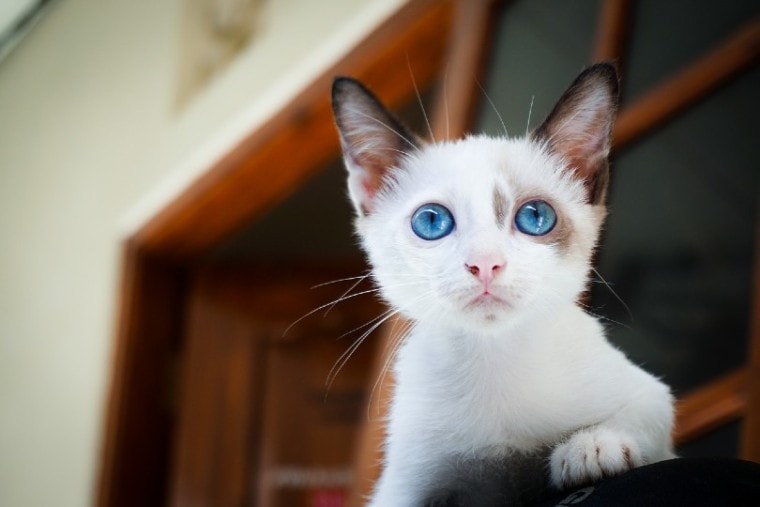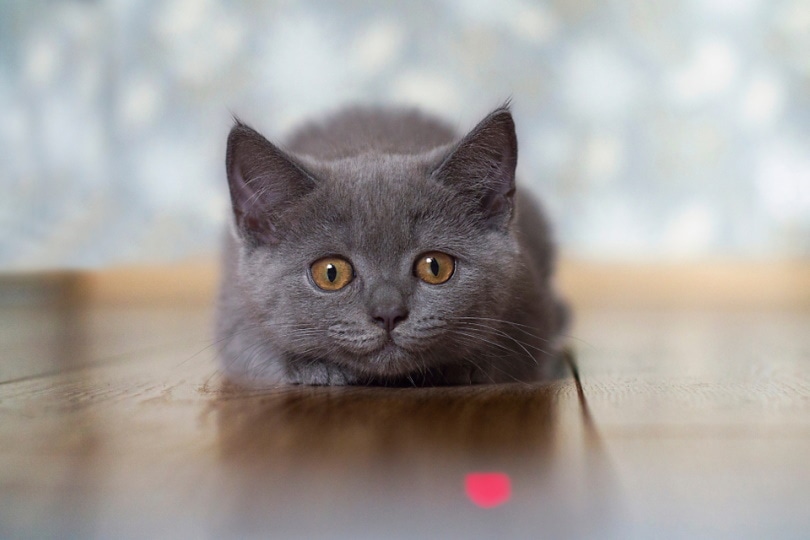
When a kitten is born, they will not have the same eye color that they will have as an adult. Instead, their eyes are a beautiful baby blue color. The eye color will begin to develop when the kitten is 7 weeks old, typically around the same age when they are weaned.
The baby blue eyes will then develop into a range of greens, browns, oranges, yellows, and amber. You may even notice your kittens’ eyes changing color as early as 3 weeks of age.
Do Kittens Eyes Change Color?
Kittens are not born with distinct eye color, and it only develops as they mature. All kittens are born with a blue eye coloration, which will change depending on the melanin in the kitten’s iris. This blue coloration is due to a lack of color in the iris combined with reflected light. It may seem like your kittens’ eyes are a definite blue, it’s just transparency in the outer eye.
The blue hue is mainly light reflected off the cornea, and the four thick layers to the kitten’s eye will dilute the color and reflect sources of light in the environment. Vision comes first for kittens, and eye color comes second during the development stage.

When Do Kittens Eyes Change Color?
A kitten’s eyes will begin to mature after the second week of its life. They are born with their eyelids sealed shut, so you will not be able to see their eye color during this time.
Once the eyes begin to open, your kitten is in a developmental stage where they are learning to see. They will retain the blue eye color till they reach around 6 to 7 weeks of age. The eye contains melanocytes, and once the kittens’ eyes start to fully develop, then the iris contains melanocytes that start to produce melanocytes which gives the mature eye its color.
You can see the color-forming in the iris in your kitten between 3 to 7 weeks, and sometimes it may take longer for the mature eye color to form.
Eye maturation is the latest stage of development in kittens, which is why their eye color can change so much before they are weaned.
What Determines A Kittens Eye Color?
The amount of melanin produced will determine your kitten’s eye color. You can expect the eye color to match their parents, but it is not uncommon for a kitten to have an entirely different eye color than their parents or siblings.
The eye color depends on the amount of melanin that the kittens’ melanocytes are producing. Light green means that the kitten’s iris has produced a low amount of melanin, whereas kittens with brown eyes have produced the most.
There are some exceptions to the rule, as some kittens will keep the blue eye color. This is mainly due to the kitten’s melanin production, which occurs little to none in blue-eyed cats.
There are also colorpoint cat breeds that are more likely to keep their blue eyes, such as the Siamese and their genetic contributors the Balinese and Ragdoll.
Interestingly, kittens who have partial albinism will have no eye pigmentation due to limited melanin. This will also be seen on their fur, which is usually white. However, not all white-furred cats will have blue eyes, as true albino cats will develop red eyes due to the blood vessels.
Final Thoughts
Once your kitten’s final eye color has developed, the color will stay that way throughout their lifetime and rarely change unless they develop a condition that affects their eyes.
It is fascinating to learn about the eye color stages that kittens go through, as many cat owners miss this stage of rapid maturation if they adopt or buy a fully weaned kitten. The eye color can also be a telling sign of your kitten’s age, as most kittens will have completely lost their blue eye color once they reach 8 weeks of age.
- Related Read: Why Do Some Cats Have Two Different Colored Eyes?
Featured Image Credit: Pexels, Pixabay







